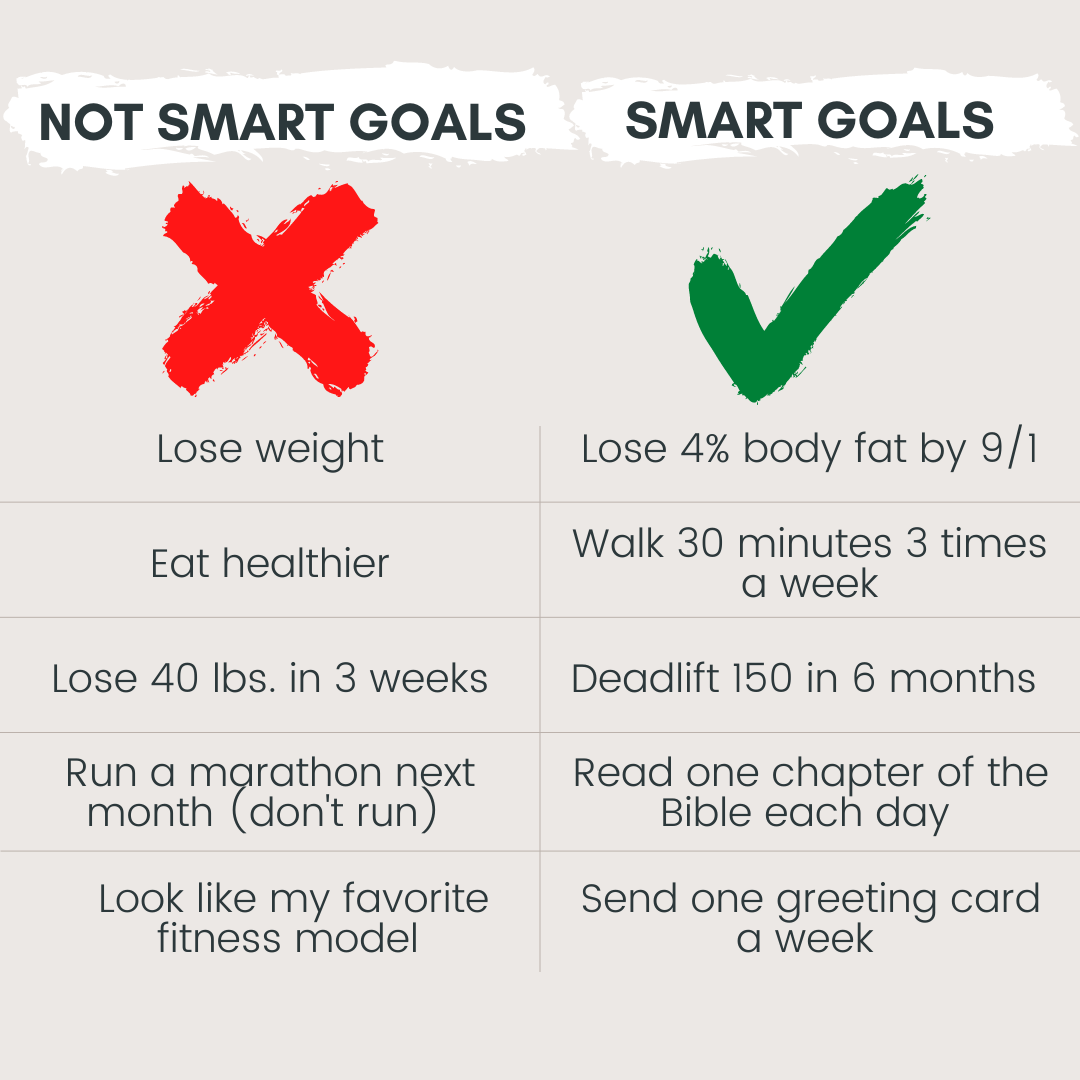
Personal growth goes hand in hand with setting goals. Goal setting is important when it comes to getting healthier, but goals can help us move forward to many areas of life - physical, emotional, spiritual, etc. But all too often, we tend to fall short in achieving our goals. Why? Perhaps they are too difficult, too vague, or do not provide enough motivation. So how can we set goals that will set us up for success?
 First, let’s analyze the three major types of goals: outcome goals, performance goals, and process goals. An outcome goal focuses on an end result associated with winning or losing. For example, perhaps you are looking to beat your coworkers in a step competition or win a weight loss challenge. A performance goal is associated with personal achievement. Running a 5k under 30 minutes or losing 10 pounds are examples of performance goals. The focus is on self-improvement. A process goal focuses on the steps necessary in order to improve. For example, in order to lose 10 pounds, perhaps you decide you need to exercise for 30 minutes, five days a week.
First, let’s analyze the three major types of goals: outcome goals, performance goals, and process goals. An outcome goal focuses on an end result associated with winning or losing. For example, perhaps you are looking to beat your coworkers in a step competition or win a weight loss challenge. A performance goal is associated with personal achievement. Running a 5k under 30 minutes or losing 10 pounds are examples of performance goals. The focus is on self-improvement. A process goal focuses on the steps necessary in order to improve. For example, in order to lose 10 pounds, perhaps you decide you need to exercise for 30 minutes, five days a week.
Although outcome goals can be rewarding, they usually have a clear ending point once your desired outcome is achieved. Since we want to achieve continual self-improvement, our main focus of wellness goals should be performance goals and process goals.
And as we think about performance and process goals, we can set ourselves up for success by getting smart with our goals. S.M.A.R.T., that is. Let’s analyze what this means.
First, your goals need to be SPECIFIC. “Do your best” is not a specific goal. Instead, your goals should address the questions: What do you want to accomplish? How often or how much? Where will it take place? Think about breaking down major goals (i.e. - losing 50 pounds) into smaller, short-term steps (i.e. - losing one to two pounds a week).
 Next, we want your goals to me MEASURABLE. What will define success? Measurements will give you specific feedback and hold you accountable. And think about using these measures, not just for the end result, but as landmarks to keep you motivated throughout the process.
Next, we want your goals to me MEASURABLE. What will define success? Measurements will give you specific feedback and hold you accountable. And think about using these measures, not just for the end result, but as landmarks to keep you motivated throughout the process.
Although it is important to challenge yourself, your goals must also be ATTAINABLE. If you’ve never run or walked more than a couple miles at a time, you might not want to sign up for next month’s local marathon. There’s no better way to set yourself for failure than demanding of yourself something you can’t achieve. Know your limitations. We all have them, and that’s okay. We’re looking to stretch ourselves, not break ourselves!

It is important that your goals are REALISTIC. This goes hand in hand with goals being attainable, but focuses more on the timeframe. As a beginning runner, next month’s marathon might be out of the question, but perhaps next year’s marathon is a great long-term goal! And if it looks as though one of your goals was perhaps a little too ambition, there’s no shame in adjusting that goal to fit what can reasonably be achieved. We want to set ourselves up for success!
And lastly, our goals should be TIMELY. Setting a timeframe in which you plan to achieve your goal will help you to stay accountable and motivated. Ideally, you want to set both long-term goals, as well as short-term measurable action steps that will propel you to achieve your long-term goal.
So let’s look at a few examples of some SMART and not so SMART goals.

 And if you want to take your accountability to the next level, share your goals. Tell a friend. Write them down. If you’re really daring, post them on social media. Announcing your goals, along with all your wins along the way, can be a huge motivator, not just for yourself, but for others who might be holding back in trying to reach their goals. Wouldn’t it be cool to know that your commitment to self-improvement rubs off and helps others to do the same?
And if you want to take your accountability to the next level, share your goals. Tell a friend. Write them down. If you’re really daring, post them on social media. Announcing your goals, along with all your wins along the way, can be a huge motivator, not just for yourself, but for others who might be holding back in trying to reach their goals. Wouldn’t it be cool to know that your commitment to self-improvement rubs off and helps others to do the same?
 So remember, we want to set specific goals that are both realistic and challenging. Set both short- and long-term goals that can be measured and celebrated. Announce your goals and celebrate your wins. And be prepared to adjust your tactics as necessary. I’d love to hear your goals! Please feel free to share some of them in the comments section.
So remember, we want to set specific goals that are both realistic and challenging. Set both short- and long-term goals that can be measured and celebrated. Announce your goals and celebrate your wins. And be prepared to adjust your tactics as necessary. I’d love to hear your goals! Please feel free to share some of them in the comments section.
















0 Comments